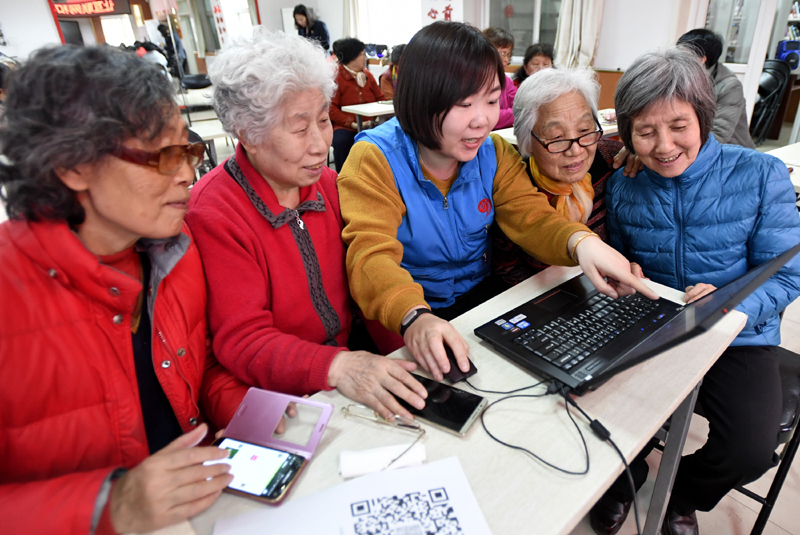


A volunteer teaches elderly residents to shop online in Fengtai district, Beijing. (Xinhua/Li Xin)
Online shopping has become the new favorite past time of China’s older generation, with 92 percent preferring to shop online with their smartphone. On Oct. 17, Beijing Morning Post reported that Chinese seniors favor intelligent products, cosmetics, clothes, and health products.
The number of elderly consumers on online shopping sites Taobao and Tmall has increased 1.6 times over the last three years, according to a data report on consumption of Chinese consumers over 50 years old, recently released by China’s largest e-commerce conglomerate Alibaba.
Big data from China’s e-commerce giant JD.com indicates that the growth of per capita expenditure of Chinese seniors on its online stores is now 20 percent higher than the average annual increase of website consumers.
The number of elderly mobile payment users has doubled in the last year, while the elderly are now 2.5 times more likely to use offline biometric payment methods like fingerprint or facial recognition according to statistics published by Alipay, a third-party mobile and online payment platform in China.
The number of seniors who use their mobile phones to pay living expenses such as water, electricity, and gas has increased by 108 percent, as shown in the data from Alipay.
Besides their ever-growing passion for online shopping and mobile payment, China’s senior consumers have also shown a preference for intelligent devices, cosmetics, and sports-related products.
Compared with 2017, Suning.com witnessed a 31 percent decline in sales of simplified mobile phones which are specially designed for the elderly, seeing a 12.5 percent rise in smartphone sales in the same age bracket.
Suning.com is not the only company to notice this trend. The sale of Single Lens Reflex cameras has increased by 68.8 percent year-on-year, with a per capita expenditure of 24,204 yuan (about $ 3,488).
Statistics from the report shows that 60 percent of senior consumers on Taobao and Tmall buy cosmetics an average of six times a year.
This year, elderly consumers spent 4.4 times as much money on medical cosmetics compared with last year, with a preference for anti-aging and anti-wrinkle products, as shown in data from AliHealth, a health and medical platform under Alibaba.
Seniors in China also prefer purchasing health products online compared with their younger counterparts. Koubei, Alibaba’s platform for local life services, suggests that the per capita expenditure of Beijing’s elderly on services including pedicure, massage, and sauna is 11 percent higher than the city’s average.
Furthermore, besides old hobbies like swimming, dancing, and badminton, elderly Chinese people have developed a passion for golf and bodybuilding. According to Koubei, senior expenditure on golf and bodybuilding has witnessed a growth of over 70 percent in the last nine months.
 Fire brigade in Shanghai holds group wedding
Fire brigade in Shanghai holds group wedding Tourists enjoy ice sculptures in Datan Town, north China
Tourists enjoy ice sculptures in Datan Town, north China Sunset scenery of Dayan Pagoda in Xi'an
Sunset scenery of Dayan Pagoda in Xi'an Tourists have fun at scenic spot in Nanlong Town, NW China
Tourists have fun at scenic spot in Nanlong Town, NW China Harbin attracts tourists by making best use of ice in winter
Harbin attracts tourists by making best use of ice in winter In pics: FIS Alpine Ski Women's World Cup Slalom
In pics: FIS Alpine Ski Women's World Cup Slalom Black-necked cranes rest at reservoir in Lhunzhub County, Lhasa
Black-necked cranes rest at reservoir in Lhunzhub County, Lhasa China's FAST telescope will be available to foreign scientists in April
China's FAST telescope will be available to foreign scientists in April "She power" plays indispensable role in poverty alleviation
"She power" plays indispensable role in poverty alleviation Top 10 world news events of People's Daily in 2020
Top 10 world news events of People's Daily in 2020 Top 10 China news events of People's Daily in 2020
Top 10 China news events of People's Daily in 2020 Top 10 media buzzwords of 2020
Top 10 media buzzwords of 2020 Year-ender:10 major tourism stories of 2020
Year-ender:10 major tourism stories of 2020 No interference in Venezuelan issues
No interference in Venezuelan issues
 Biz prepares for trade spat
Biz prepares for trade spat
 Broadcasting Continent
Broadcasting Continent Australia wins Chinese CEOs as US loses
Australia wins Chinese CEOs as US loses